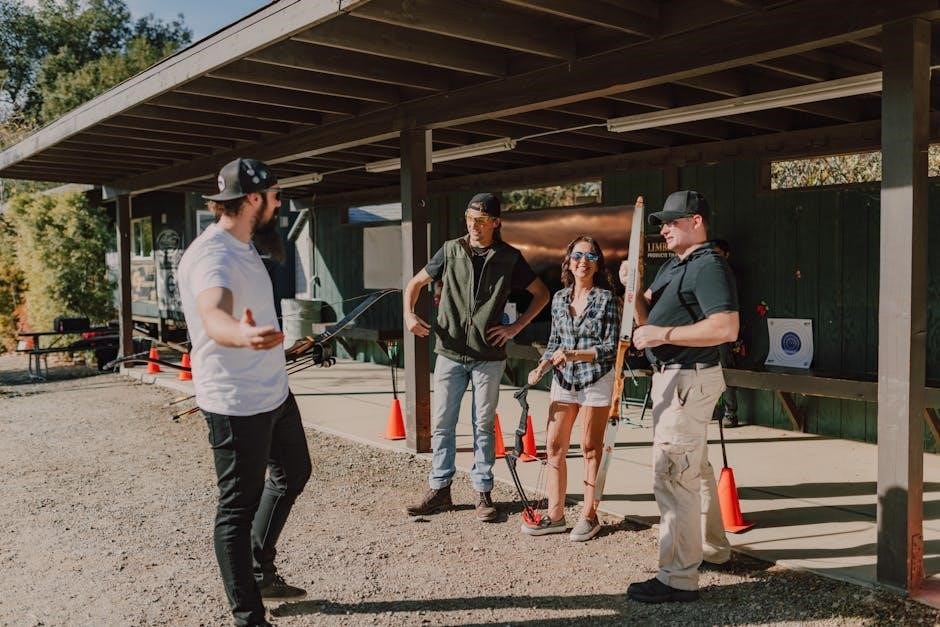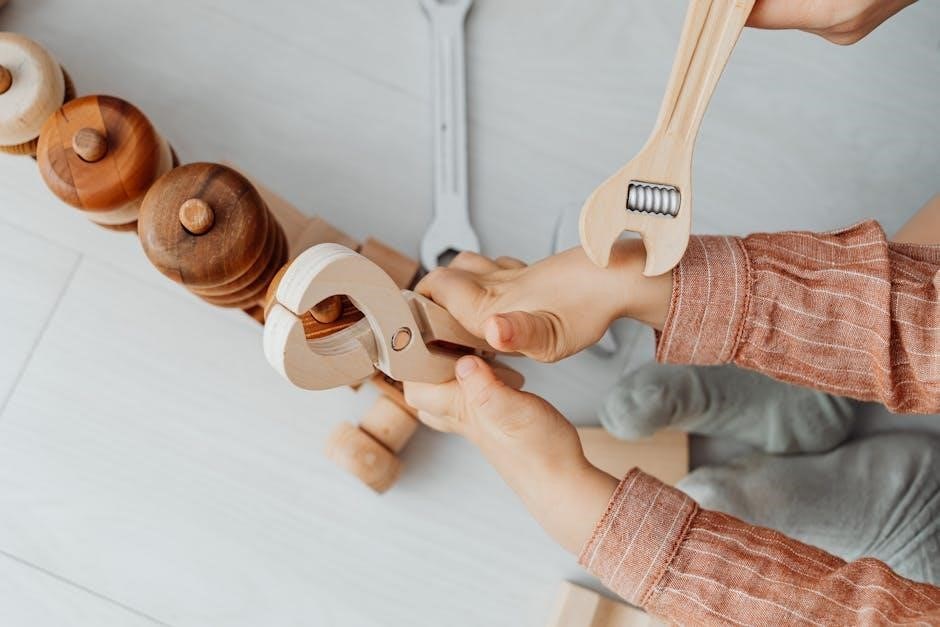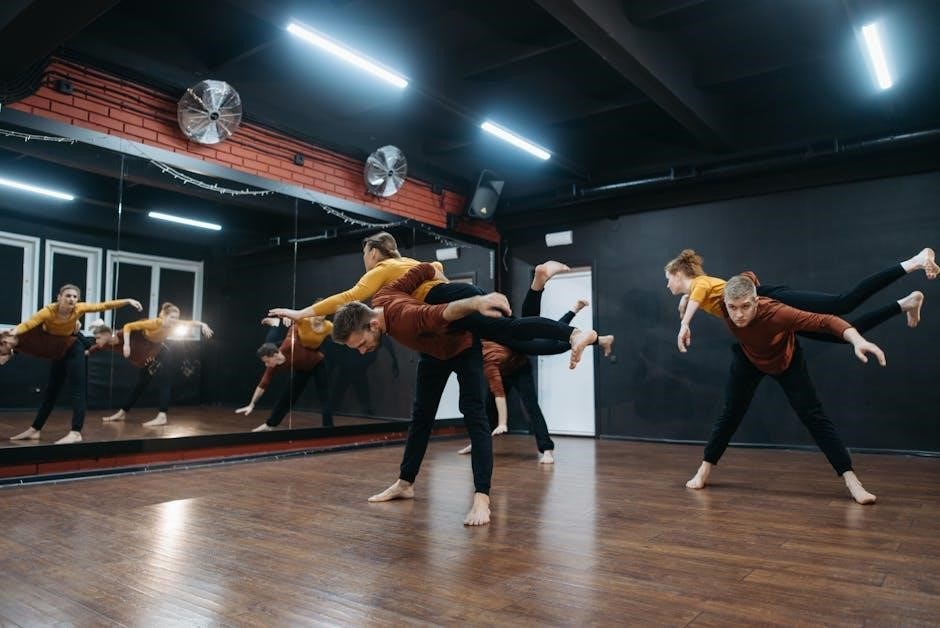Fine motor coordination involves precise movements of hands, fingers, and wrists, essential for daily tasks like writing, buttoning shirts, or using utensils. Engaging in targeted activities enhances dexterity, hand-eye coordination, and strength, benefiting both productivity and leisure.
1.1 What Is Fine Motor Coordination?
Fine motor coordination refers to the ability to make precise, controlled movements using the hands, fingers, and wrists. It involves hand-eye coordination, dexterity, and strength, enabling tasks like writing, buttoning shirts, or using tools. Developing this skill enhances daily functioning, creativity, and independence, making it vital for both practical and recreational activities.
1.2 Why Is Fine Motor Coordination Important for Adults?
Fine motor coordination is crucial for adults as it enhances productivity, supports daily tasks, and improves quality of life. It fosters hand-eye coordination, dexterity, and strength, enabling efficient performance of activities like cooking, dressing, and using technology. Strong fine motor skills also promote independence, reduce the risk of injuries, and support long-term cognitive and motor health.

Challenges Faced by Adults in Developing Fine Motor Skills
Adults often face challenges in developing fine motor skills due to lack of practice, stress, fatigue, and cognitive issues, which can hinder hand-eye coordination and dexterity.
Common reasons for difficulty in developing fine motor skills among adults include a lack of consistent practice, stress, fatigue, and cognitive impairments. These factors can affect motor planning, hand-eye coordination, and overall dexterity, making everyday tasks more challenging. Additionally, injuries or neurological conditions can further impede fine motor skill development. Stress and fatigue can impair fine motor coordination by reducing focus and hand-eye precision. Cognitive issues, such as memory or attention deficits, further hinder motor planning and execution. These factors collectively make tasks requiring dexterity more difficult, emphasizing the need for tailored strategies to address these challenges effectively and improve motor function. Fine motor activities enhance hand-eye coordination, dexterity, and strength, improving daily task performance and promoting independence. They also boost cognitive focus and overall motor function effectively. Hand-eye coordination is vital for tasks like catching, throwing, and manipulating objects. Activities such as puzzles, bead threading, and typing exercises refine this skill, enhancing precision and timing. These exercises strengthen neural pathways, improving synchronization between visual perception and motor responses, which is essential for both practical and recreational activities. Regular practice fosters better overall coordination and dexterity. Activities like puzzles, bead threading, and typing exercises enhance dexterity by refining finger movements and precision. Strengthening exercises, such as using therapy putty or finger resistance bands, improve grip and endurance. These tasks target small muscle groups, boosting overall hand functionality and motor control, which are essential for daily tasks and maintaining independence. Regular practice yields noticeable improvements. Fine motor coordination activities empower adults to perform daily tasks independently, such as cooking, dressing, and managing medication. Skills like utensil use, buttoning, and handling small objects are enhanced, fostering self-reliance. These activities strengthen dexterity, enabling individuals to accomplish activities of daily living (ADLs) and instrumental ADLs with greater ease and confidence, promoting overall independence. Everyday activities like meal preparation, cooking, dressing, grooming, and medication management are simple yet effective ways to enhance fine motor skills. These tasks improve dexterity, coordination, and strength. Meal preparation and cooking offer numerous opportunities to enhance fine motor skills. Activities such as chopping vegetables, stirring mixtures, and handling utensils require precision and coordination. These tasks improve hand-eye coordination, finger dexterity, and overall motor control, making them ideal for daily practice and skill development. Dressing and grooming are excellent fine motor activities for adults. Tasks like buttoning shirts, tying shoelaces, and zipping jackets require precise hand movements and coordination. These activities enhance finger dexterity, hand-eye coordination, and overall motor control, making them practical and effective for improving fine motor skills in daily routines. Medication management is a practical fine motor activity for adults. Sorting pills, opening containers, and pouring doses require precise hand movements and coordination. These tasks enhance finger dexterity, hand-eye coordination, and focus, making them ideal for improving motor skills while maintaining independence in daily routines. Engaging in activities like puzzles, brain teasers, and card games enhances fine motor skills while providing entertainment; These games improve hand-eye coordination and dexterity in an enjoyable way. Puzzles and brain teasers are excellent for improving fine motor coordination in adults. Activities like jigsaw puzzles, crosswords, Sudoku, and 3D puzzles enhance hand-eye coordination and dexterity. They also sharpen cognitive skills, making them a fun and engaging way to boost motor precision while stimulating the mind. Board and card games like chess, checkers, and poker offer engaging ways to enhance fine motor coordination. Activities such as moving pieces, shuffling cards, and dealing hands improve dexterity and hand-eye precision. These games provide a fun, social approach to refining motor skills while fostering cognitive engagement and strategic thinking. Outdoor activities such as fishing, horseshoes, and ring toss are excellent for refining fine motor coordination. Fishing requires precise casting and reeling, while yard games demand accuracy and control in throwing or aiming. These activities not only enhance hand-eye coordination and dexterity but also provide a refreshing, stress-relieving way to improve motor skills in a natural setting. Engaging in crafts like crocheting, bead threading, and jewelry making enhances fine motor skills through precise hand movements. Playdough modeling and clay shaping also improve dexterity and coordination; Crochet and knitting are excellent fine motor activities for adults, requiring precise hand movements and coordination. These crafts enhance finger dexterity, hand-eye coordination, and strength while creating items like lap blankets or scarves. The repetitive motions help improve motor control and can be therapeutic, promoting relaxation and focus. Bead threading and jewelry making are engaging fine motor activities that require precision and hand-eye coordination. Adults can enhance dexterity by manipulating small beads, strings, and tools. These tasks strengthen finger muscles, improve motor control, and provide a creative outlet, making them both therapeutic and enjoyable for skill development. Playdough and clay modeling are excellent fine motor activities for adults, enhancing hand strength, dexterity, and coordination. Rolling, flattening, and shaping the material improve finger control and precision. These creative exercises also provide a calming, meditative experience, making them ideal for stress relief while promoting motor skill development. Technology-based activities, like typing exercises and app-based games, enhance finger precision and coordination. These tools offer interactive ways to improve fine motor skills through engaging digital tasks. Typing and keyboarding exercises are excellent for enhancing fine motor skills. By practicing precise finger movements, adults can improve dexterity, hand-eye coordination, and typing accuracy. These exercises also promote muscle memory, reducing fatigue during computer use. Regular practice strengthens finger independence and control, making daily tasks requiring keyboarding more efficient and less straining. App-based games offer engaging and interactive ways to improve fine motor skills. Games like puzzles, tracing exercises, and finger dexterity challenges provide fun and motivating practice. These apps often include progress tracking, making it easy to monitor improvement. They are portable and accessible, allowing adults to practice anytime, enhancing hand-eye coordination and finger precision effectively. Engaging older adults in activities like finger crochet, therapy ball exercises, and sorting small objects enhances hand-eye coordination and dexterity, promoting independence and cognitive function naturally. Finger crochet and lap blankets are excellent fine motor activities for older adults. They require precise hand-eye coordination and finger dexterity, strengthening small hand muscles. These activities improve motor control and provide a sense of accomplishment. They are also calming and can be adapted to suit various skill levels, making them ideal for therapy or leisure. Therapy balls and putty exercises are versatile tools for improving fine motor skills in older adults. They provide resistance to strengthen hand muscles and enhance finger dexterity. Activities like squeezing, stretching, and molding the putty or rolling the ball require coordination, helping to restore motor function and independence in daily tasks. These exercises are both therapeutic and engaging. Sorting and organizing small objects, such as coins, beads, or buttons, is an effective fine motor activity. It improves hand-eye coordination, dexterity, and cognitive focus. Adults can sort objects by shape, size, or color, enhancing motor precision while providing a sense of accomplishment and mental stimulation, making it both practical and enjoyable. Occupational therapy plays a crucial role in improving fine motor skills through tailored activities, assessments, and adaptive tools, helping adults enhance coordination and independence in daily tasks effectively.
Occupational therapists create personalized plans tailored to individual needs, focusing on specific fine motor goals. These plans often include exercises like bead threading or using therapy putty, designed to improve dexterity, strength, and coordination. Regular progression ensures activities remain challenging yet achievable, promoting steady improvement in motor skills and daily functionality. Adaptive tools, such as oversized grips and specialized utensils, assist adults in performing tasks with ease. These tools enhance grip strength and precision, making activities like writing or cooking more accessible. They are often recommended by occupational therapists to support fine motor development and promote independence in daily living. Regular use can lead to significant skill improvement. Fine motor coordination exercises for rehabilitation focus on rebuilding hand-eye coordination, dexterity, and strength. Activities like therapy ball exercises, tabletop tasks, and MusicGlove therapy aid recovery post-stroke or injury. Therapy ball exercises enhance finger strength and coordination by manipulating small balls with precision. Activities include rolling, pressing, and transferring balls between hands, improving dexterity and motor control. These exercises are particularly effective for rehabilitation, as they simulate real-life movements and strengthen hand muscles, aiding recovery post-injury or stroke. Regular practice boosts overall fine motor function. Tabletop exercises and stacking activities are effective for improving fine motor skills. Tasks like stacking coins, sorting objects, or arranging small items enhance hand-eye coordination and dexterity; These activities simulate daily tasks, making them practical for rehabilitation. Regular practice strengthens finger movements, aiding recovery and improving overall motor function in adults. MusicGlove hand therapy is a motivational tool for improving fine motor skills. By pressing sensors on a glove to play music, users enhance finger dexterity and coordination. This engaging method makes therapy enjoyable, promoting consistent practice. It’s particularly useful for adults in rehabilitation, aiding in the recovery of hand function and overall motor precision. Progression involves advancing from simple to complex tasks, ensuring continuous improvement in dexterity and coordination. Starting with basic exercises, adults can gradually tackle more challenging activities, enhancing their motor skills effectively. This structured approach ensures steady growth and mastery of fine motor functions over time. Begin with basic exercises like finger stretches, pencil rolling, and stacking coins to build foundational dexterity. These simple tasks improve hand-eye coordination and finger isolation, creating a strong base for more complex activities. Gradual progression ensures adults can confidently move to advanced exercises, fostering steady improvement in fine motor skills over time. As adults master simple tasks, introducing more complex activities enhances fine motor skills further. Examples include puzzles, bead threading, or intricate crafts, which challenge dexterity and coordination. Gradually adding complexity prevents frustration and ensures steady progress, helping adults achieve advanced levels of hand-eye coordination and precision in their daily and therapeutic routines. Morning warm-ups and integrating activities into leisure time help maintain fine motor skills. Simple tasks like buttoning shirts or using utensils can be practice opportunities, enhancing dexterity and coordination naturally throughout the day. Start your day with simple finger stretches, thumb opposition exercises, and pencil rolls. These activities boost hand flexibility and prepare muscles for daily tasks, improving coordination and dexterity gradually. Incorporate fine motor exercises into hobbies like crocheting, puzzles, or card games. These activities enhance dexterity while providing relaxation and enjoyment. Even tasks such as cooking or gardening can serve as leisurely ways to improve coordination and strength, making skill development a natural part of your daily routine. Use specific assessments and exercises to evaluate fine motor skill development. Track improvements through repeated tasks and performance enhancements, ensuring progress is clearly visible and measurable over time. Setting realistic and specific goals is crucial for improving fine motor skills. Break tasks into manageable steps, allowing gradual progression. For instance, start with simple activities like buttoning a shirt and advance to more complex tasks, ensuring each step is achievable and builds confidence. Celebrate small victories to maintain motivation and track development effectively over time. Regularly documenting progress in fine motor skills helps identify improvements and areas needing attention. Use journals, photos, or videos to record milestones like increased dexterity or task accuracy. Celebrate small achievements to stay motivated. Consider setting weekly or monthly check-ins to assess development and adjust activities as needed for continued growth and refinement of skills. Fine motor coordination is vital for adults, enhancing daily tasks and overall dexterity. For further guidance, download our PDF guide packed with exercises, tips, and worksheets. Fine motor development is a lifelong process, offering benefits like improved dexterity, enhanced hand-eye coordination, and greater independence. Regular practice through activities like puzzles, cooking, or crafts fosters these skills. Embracing these exercises can significantly enhance quality of life, making everyday tasks more manageable and enjoyable. Consistency is key to achieving lasting improvement. Downloadable PDF guides and worksheets offer structured plans for improving fine motor skills. These resources include exercises, activity ideas, and tracking tools. They provide a convenient way to practice at home, ensuring consistent progress. Many guides are tailored for adults, offering adaptable exercises to meet individual needs and skill levels. Regular use enhances dexterity and coordination effectively.2.1 Common Reasons for Difficulty
2.2 The Impact of Stress, Fatigue, and Cognitive Issues

Benefits of Fine Motor Coordination Activities for Adults
3.1 Improving Hand-Eye Coordination
3.2 Enhancing Dexterity and Strength
3.4 Promoting Independence in Daily Tasks

Everyday Activities for Fine Motor Skill Development
4.1 Meal Preparation and Cooking
4.2 Dressing and Grooming
4.3 Medication Management
Fun and Engaging Fine Motor Games for Adults
5.1 Puzzles and Brain Teasers
5.2 Board Games and Card Games
5.3 Outdoor Activities Like Fishing and Yard Games

Crafts and Creative Activities for Fine Motor Development
6.1 Crochet and Knitting
6.2 Bead Threading and Jewelry Making
6.3 Playdough and Clay Modeling

Technology-Based Fine Motor Activities
7.1 Typing and Keyboarding Exercises
7.2 App-Based Fine Motor Coordination Games
Fine Motor Activities for Older Adults
8.1 Finger Crochet and Lap Blankets
8.2 Therapy Balls and Putty Exercises
8.3 Sorting and Organizing Small Objects
Role of Occupational Therapy in Fine Motor Development
9.1 Customized Activity Plans
9.2 Adaptive Tools for Motor Skill Improvement

Fine Motor Coordination Exercises for Rehabilitation
10.1 Therapy Ball Exercises
10.2 Tabletop Exercises and Stacking Activities
10.3 MusicGlove Hand Therapy
Progression of Fine Motor Activities
11.1 Starting with Simple Tasks
11.2 Gradually Increasing Complexity
Incorporating Fine Motor Exercises into Daily Routine
12.1 Morning Warm-Up Exercises
12.2 Integrating Activities into Leisure Time

Measuring Progress and Improvement
13.1 Setting Achievable Goals
13.2 Tracking Improvement Over Time
14.1 Final Thoughts on Fine Motor Development
14.2 Downloadable PDF Guides and Worksheets